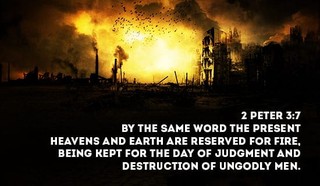
- Recent Translations
- All Translations
2 Peter 3:8
Share
Settings
Images for 2 Peter 3:8

2 Peter 3:8 Meaning and Commentary
But, beloved, be not ignorant of this one thing
Here the apostle addresses the saints he writes unto, and for whom he had a tender affection and regard, and for whose welfare he was concerned, lest they should be stumbled at the length of time since the promise of the coming of Christ was given, and which these scoffers object; and therefore he would have them know, observe, and consider this one thing, which might be of great use to them to make their minds easy, and keep up their faith and expectation of the coming of Christ:
that one day [is], with the Lord as a thousand years, and a thousand
years as one day;
referring either to ( Psalms 90:4 ) ; or to a common saying among the Jews, founded on the same passage, (Mynv Pla hb "qh) (lv wmwy) , "the day of the holy blessed God is a thousand years" F26; suggesting, that though between thirty and forty years had elapsed since the promise was given out that Christ would come again, and should even a thousand, or two thousand years more, run off, before the coming of Christ, yet this should be no objection to the accomplishment of the promise; for though such a number of years is very considerable among men, ye not "with God", as the Arabic and Ethiopic versions read, with whom a thousand years, and even eternity itself, is but as a day, ( Isaiah 43:13 ) . Unless this phrase should be thought to refer, as it is by some, to the day of judgment, and be expressive of the duration of that: it is certain that the Jews interpreted days of millenniums, and reckoned millenniums by days, and used this phrase in confirmation of it. Thus they say F1,
``in the time to come, which is in the last days, on the sixth day, which is the sixth millennium, when the Messiah comes, for the day of the holy blessed God is a thousand years.''And a little after,
``"the Lord hath created a new thing in the earth, a woman shall compass a man". This is in the time of the Messiah which is in the sixth day.''And elsewhere F2,
``the sixth degree is called the sixth day, the day of the holy blessed God is a thousand years. And in that day the King Messiah shall come, and it shall be called the feast of gathering, for the holy blessed God will gather in it the captivity of his people.''So they call the sabbath, or seventh day, the seventh millennium, and interpret F3
``"the song for the sabbath day", ( Psalms 92:1 ) title, for the seventh millennium, for one day of the holy blessed God is a thousand years.''To which agrees the tradition of Elias, which runs thus F4;
``it is the tradition of the house of Elias, that the world shall be six thousand years, two thousand years void (of the law), two thousand years the law, and two thousand years the days of the Messiah;''for they suppose that the six days of the creation were expressive of the six thousand years in which the world will stand; and that the seventh day prefigures the last millennium, in which will be the day of judgment, and the world to come; for
``the six days of the creation (they say F5) is a sign or intimation of these things: on the sixth day man was created; and on the seventh his work was finished; so the kings of the nations of the world (continue) five millenniums, answering to the five days, in which were created the fowls, and the creeping things of the waters, and other things; and the enjoyment of their kingdom is a little in the sixth, answerable to the creation of the beasts, and living creatures created at this time in the beginning of it; and the kingdom of the house of David is in the sixth millennium, answerable to the creation of man, who knew his Creator, and ruled over them all; and in the end of that millennium will be the day of judgment, answerable to man, who was judged in the end of it; and the seventh is the sabbath, and it is the beginning of the world to come.''
F26 Bereshit Rabba, sect. 8. fol. 7. 3. Vajikra Rabba, sect. 19. fol. 160. 2. Bemidbar Rabba, sect. 14. fol. 216. 1. Shirhashirim Rabba, fol. 20. 1. Zohar in Exod. fol. 60. 1. Tzeror Hammor, fol. 157. 1. & Nishmet Chayim Orat. 1. c. 5. fol. 12. 1.
F1 Zohar in Gen. fol. 13. 4.
F2 Ib. fol. 16. 1.
F3 Bartenora in Misn. Tamid, c. 7. sect. 4.
F4 T. Bab. Sanhedrin, fol. 97. 1. & Avoda Zara, fol. 9. 1.
F5 Ceseph Misna in Maimon. Hilchot Teshuva, c. 9. sect. 2.
2 Peter 3:8 In-Context
Cross References 1
-
1.
3.8
Psalms 90.4 .